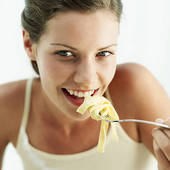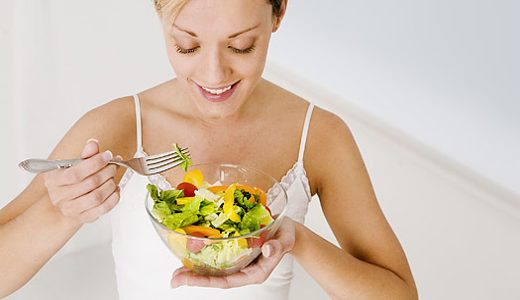What is not widely appreciated, but makes absolute common sense when you think about it, is that looking healthy is equally likely to be attributable to our diet and lifestyle as it is to external applications designed to preserve our youthful appearance.
The concept of `eating yourself beautiful` is scientifically founded, as there are classical physical signs of nutritional deficiency, which can be identified by just looking in the mirror! Our bodies are very efficient at communicating what is wrong, the only problem is that we are not tuned in to the messages, and most of us are not sufficiently educated to
recognise a nutritional inadequacy; and that’s only half of the story. Knowing that the red greasy patches at the side of our nose are related to a Vitamin B shortage, or that the presence of acne means that zinc is in short supply, wouldn’t necessarily open the door to a solution for most of us as most, unless we were unfamiliar with the foods rich in those important nutrients.
Nutritional deficiencies are incredibly common. Three separate studies undertaken by the Natural Health Advisory Service, on women of childbearing age, revealed that between 50 to 80 percent had low stores of the mineral magnesium and many other nutrients including B vitamins, zinc, iron, essential fatty acids and calcium were often in short supply.
Our body’s need a constant supply of good nutrients in order to serve us well, and in the absence of this it communicates by providing physical signs of deficiency; the only problem being that most of us wouldn’t recognise a nutritional deficiency even if it hit us on the nose. Let’s take a look at some of the most common problems and how they can be overcome.
Skin
 Dry skin can be attributable to too much sun and wind, without using creams or eating adequate quantity of essential fatty acids, or a shortage of vitamins A, necessary for cell membrane health and vitamin E, which protects the skin cells from free radical damage. Eat green leafy vegetables, nuts and seeds and oily fish to help encourage healthy cells and give natural ‘lubrication’, and apply vitamin E oil topically. Dry skin can be due to insufficient fluids, so ensure you drink at least 6 glasses of fluid, especially water, each day. In addition, try some of the rich skin creams that have been made from all natural products without any harmful chemicals which are available from www.naturalhealthas.com
Dry skin can be attributable to too much sun and wind, without using creams or eating adequate quantity of essential fatty acids, or a shortage of vitamins A, necessary for cell membrane health and vitamin E, which protects the skin cells from free radical damage. Eat green leafy vegetables, nuts and seeds and oily fish to help encourage healthy cells and give natural ‘lubrication’, and apply vitamin E oil topically. Dry skin can be due to insufficient fluids, so ensure you drink at least 6 glasses of fluid, especially water, each day. In addition, try some of the rich skin creams that have been made from all natural products without any harmful chemicals which are available from www.naturalhealthas.com
A pale complexion is not always an unhealthy sign, as some have a perfect but ‘English Rose’ complexion. However, a pale complexion can be due to anaemia, which is commonly experienced by menstruating women and vegetarians are also susceptible, who, perhaps are not eating an adequate diet, particularly low in iron, B12. These nutrients are most abundant in meat products and dairy foods, so it is easy to for these groups to become deficient. Eat plenty of green leafy vegetables and nuts and seeds, which are a good source of iron. Most cereals are fortified with iron and folic acid. Lean meat, eggs and to a lesser extent fish are good sources of B12. Vegetarians should concentrate on using fortified soya milk and consider taking a B complex vitamin supplement.
Cracking and peeling lips is often associated with an insufficiency of vitamin B12. Concentrate on eating low fat dairy products, lean meat, whole grains and green vegetables. Use a good quality lip balm, and concentrate on eating essential fatty acids to soften skin.
Cracking at corners of mouth or corners of the eyes is associated with poor dietary intake of iron and vitamins B2 and B6. Vegetarians and women with heavy periods are susceptible to this condition, which can be resolved by eating iron from meat and non-meat sources. The B vitamins can be found in whole-grains, eggs, meat and dairy products. A good quality multi vitamin and mineral supplement containing iron and B vitamins could be helpful.
Red greasy skin may be hormonally related, worsening premenstrually, and can be helped by taking a good multi-vitamin and mineral supplement like Optivite which contains good levels of the B vitamins and zinc, necessary for skin health. Avoid saturated fats in the form of red meat and full fat dairy products plus keep refined carbohydrates, like sugar and white bread and flour to a minimum. Plenty of fresh fruit and vegetables every day is advisable and consume at least 6 glasses fluid, particularly water.
Rough pimply skin: drink plenty of water, at least 6 glasses each day, and ensure adequate intake of essential fats and the mineral zinc to improve skin health and reduce the dryness. Body brushing is often helpful as well as the use of a good quality moisturising cream made with natural ingredients.
Red scaly skin rash: may be due to food sensitivities or allergies, and it may be useful to follow the simple exclusion diet in the Real Life Diet. Dairy foods, shellfish, wheat and citrus fruit can inflame the rash.
Eczema: Is often food related, and can be aggravated by citrus fruit, dairy products and wheat. It can be improved by avoiding these foods and rinks and by consuming a nutrient dense diet as well as supplements of essential fatty acids, zinc and B vitamins. Sufferers often have an inability to convert the omega-6 fatty acids into their inflammatory properties, so it is suggested that an evening primrose oil supplement like Efamol is consumed daily.
Psoriasis: a skin disorder characterised by rapid growth of cells, taking 8 days to grow and mature, compared with a normal 28 days. Skin cells accumulate, creating a thick layer of dry flaky cells. It can manifest all over the body, particularly the face and scalp.
Nutritional therapy involves slowing down the cycle of cell growth and maturation, dependent on vitamin A, found in oily fish and low fat dairy products. Most cereals and breads are fortified with folic acid, and green vegetables are inherently rich in this vitamin. The minerals, zinc and selenium are found in abundance in seafood and nuts and seeds, and calcium is found in low fat dairy products, green leafy vegetables and nuts and seeds. The essential fatty acids help soften the skin cells, and make the cell membranes more flexible. Eat plenty of oily fish and nuts and seeds to ensure an adequate intake.
Wrinkles: are often the result of excess sunlight, particularly without using protection in the form of sunscreen and sunglasses. Eat plenty of fresh fruit and vegetables, particularly those with a dark green, red and yellow hue which contain plenty of antioxidants. Selenium and zinc are found in seafood and nuts and seeds. Try using Arkopharma Phyto Soya Face Cream, which has been shown to decrease the depth of wrinkles significantly within 4 weeks (available from www.naturalhealthas.com or by mail order from +44 (0) 207 631
 Hair and scalp
Hair and scalp
Generalised hair loss: Old age can exacerbate this condition, as can an inadequate intake of iron and vitamin C. Low thyroid function (hypothyroidism) can also account for hair thinning and loss.
Dandruff: Can be more prevalent in people with skin conditions like eczema and psoriasis and is often thought to be caused by a fungal infection. Eat plenty of essential fatty acids, most prevalent in oily fish, nuts and seeds and Biotin rich foods including lean meat and dairy products and wholegrains. Use anti-dandruff shampoos and perhaps apply evening primrose oil topically. Using tea tree shampoo which has natural anti-fungal/bacterial properties can also help.
Nails
Brittle nails, flattened upturned nails: iron deficiency due to either heavy menstrual bleeding, an inadequate vegetarian diet or malabsorption of the mineral. Ensure you are eating plenty of fresh green leafy vegetables, nuts and seeds and lean meat occasionally if you are not vegetarian.
White spots on nails: is sometimes thought to be due to zinc deficiency, often seen in women with inadequate dietary intake of nuts, seeds and fish. Malabsorption can present a problem, so any concerns should be investigated. Taking a supplement of hydrochloric acid facilitates zinc absorption. Take zinc supplements separately from food, preferably at night, for maximum absorption. (However, it can cause nausea, so take with food if a problem)
Mouth
Soft bleeding, spongy gums: May be due to deposits of plaque as well as nutritional deficiencies. Ensure good oral hygiene, brushing and flossing teeth twice daily to improve overall teeth and gum health. Eat plenty of vitamin C rich fresh fruit and vegetables daily. Aim for at least 4 servings of vegetables, plus a salad and 3 pieces of fresh fruit. Visit your dentist if gum health doesn’t improve. A supplement of CoQ10 facilitates oxygen distribution to the gums, as does brushing with fennel toothpaste
Red tongue: Often due to a lack of B vitamins, which are commonly in short supply, particularly vitamin B12 in vegetarians.
Sore, smooth tongue, or recurrent mouth ulcers: Can be associated with food sensitivity, particularly where mouth ulcers are concerned. Try avoiding wheat and gluten in the form of bread, pasta, cakes and biscuits containing wheat for 6 weeks. A coated, sore tongue may also point to a food intolerance, exacerbated by sugary foods and refined carbohydrates. Consume a range of wholesome foods, particularly those rich in B vitamins and zinc.
Body
Spare ‘tyre’ and fat stomach: having a genetic predisposition to storing fat around the stomach can make weight loss difficult. Plus, a lack of abdominal exercise can weaken muscle tone. Falling oestrogen levels also contribute to spreading at the middle at the time of the menopause. Phytoestrogen rich foods including soya products, pulses and linseeds and plenty of exercise will help. Further information can be found in the book Beat Menopause Naturally which is part of the Natural Menopause Kit and available from www.naturalhealthas.com or +44 (0) 207 631 4235
Cellulite: can be a result of digestive problems, such as constipation, where toxins accumulate instead of being efficiently excreted can increase cellulite levels. Elevated levels of the female hormone, oestrogen can worsen cellulite, which is often the reason why women experience heavier legs premenstrually. Caffeine can also exacerbate cellulite. Substitute herbal teas like Rooibos and cereal based coffee alternatives. Arkopharma Mincifit Gel, which contains phyto-active ingredients designed to speed up the metabolism of fats, water and toxins and remodel the appearance of the skin se cellulite and is available from www.naturalhealthas.com
Saggy Breasts: regular exercise for the pectoral muscles helps maintain firm breasts. Putting on weight often increases breast size, therefore they are less likely to stay pert.
Stretch Marks: often appear during and after pregnancy, where the skin has stretched to accommodate the growing foetus. Zinc deficiency has been linked with stretch marks. Zinc is essential for the metabolism of vitamin A, which is necessary for the integrity of our skin cell membranes. Vitamin E taken in supplement form and applied topically can minimise the appearance of stretch marks. Zinc predominates in seafood, and seeds, particularly pumpkin seeds. Eat plenty of wholegrains and nuts and seeds to ensure an adequate vitamin E intake. Try using Arkopharma Mincifit Stretch Mark Cream which has shown positive results in clinical trials is available from the shop at www.natualhealthas.com
Thread veins and varicose veins: thread and varicose veins are often hereditary. Thread veins are less of a problem, and don’t really present with any pain or discomfort. Varicose veins can be exacerbated by long term constipation where constant straining and pressure is placed on the bowel. Vitamin C and bioflavonoids, particularly rutin are useful due to their ability to strengthen capillaries. Fresh fruit and vegetables and a good source of bioflavonoids.
Pimply skin or upper arms and thighs: often worse during the winter months when arms and thighs are not exposed to sunlight. They are often exacerbated by a deficiency of essential fatty acids and vitamin E which are necessary for soft, smooth skin. Ensure an adequate intake of unsalted nuts and seeds, which provide good levels of vitamin E, and oily fish, which are rich in essential fatty acids.
Beauty Foods
Eating yourself beautiful will necessitate having three good fresh meals each day with wholesome between meal snacks on days when you are particularly hungry. Plus, taking plenty of exercise, and getting out in the sunlight when possible. If you decide that you need to top up on certain nutrients, you may need to take a supplement as well as making improvements to your diet. Take a look at the nutrient content charts and choose the foods that you like, gradually making your diet more nutrient dense.
Nutrient Dense Foods
Vitamin A – Retinol
Lambs liver
Butter
Margarine
Cheddar cheese
Porridge made with milk
Milk
herring
B Vitamins
Muesli
Rice Krispies
Corflakes
Brazil nuts
Almonds
Walnuts
Prawns
Turkey
Chicken
Lamb
Cheddar cheese
Eggs
Salmon
Sardines
pilchards
Liver
Kidney
Soya
Chickpeas
Asparagus
Vitamin E
Sunflower oil
Hazelnuts
Almonds
Rapeseed oil
Pine nuts
Sweet potato
Olive oil
Peanut butter
Walnuts
Muesli
Avocado
Mushrooms
Onions
Butter
Spinach
Parsley
Watercress
Tomoto
Egg
Broccoli
Iron
Soya flour
Rice krispies
Cornflakes
Muesli
Wholemeal flour
Lentils
Soya beans
Beef
Lamb
Brazil nuts
Egg
Spinach
Baked beans
Green peppers
Manesium
Brazil nuts
Almonds
Soya flour
Muesli
Wholemeal bread
Prawns
Banana
Lentils
Herring
Spinach
Baked beans
Salmon
Lamb turkey
Cod
Cheese
Avocado
Beef
Zinc
Beef
Lamb
Brazil nuts
Almonds
Wholemeal flour
Muesli
Turkey
Cheese
Pawns
Chicken
Lentils
Eggs
Soya bean and milk
Spinach
Tomatoes
Herring
Cod
Baked beans milk
Green peppers
Essential fatty acids
Sunflower, rapeseed, walnut and corn oil
Almonds, walnuts and Brazil nuts
Sunflower seeds
Soya
Mackerel, herring and salmon
In order to improve your nutrient levels take a strong multi-vitamin and mineral preparation daily like Optivite which is available from www.naturalhealthas.com or +44 (0) 207 631 4235, as well as the additional nutrients that are indicated. If you have been short of nutrients for some time it may well take a few months before you see the difference in the quality of you skin. When the immune system has been compromised as a result of a lack of nutrients, you may also have to avoid certain foods such as wheat and bran, or dairy products, for the first month or two, whilst you are working to redress the balance.
Making the most of the nutrients
Certain foods and social substances like tea, coffee, alcohol and tobacco can reduce the absorption of good nutrients. Because of its tannin content, a cup of tea with a meal will more than halve the iron that is available to us, whereas, because of its vitamin C content, a glass of orange juice with the same meal will more than double to available iron. Try drinking the tea substitute Rooibos, it looks like ordinary tea when make with milk, but contains no caffeine and very little tannin. Alcohol knocks most nutrients sideways, and bran blocks the absorption of important minerals like zinc, iron and magnesium. It is also recognised that those who smoke and drink alcohol in fair quantities are less likely to eat a nutritious diet.
Sample Menu
Breakfast
Oat based muesli with chopped fresh fruit, golden linseeds and bio yogurt or soya milk
Or
Fresh grapefruit and orange with sunflower seeds
With toast and sugar free fruit spread
Dandelion coffee
Mid-morning snack
Unsalted nuts and organic raisins or fresh fruit
Rooibos Tea
Lunch
Jacket potato with tuna mayonnaise or humus
Mixed salad with mung beans
A glass of fresh fruit juice
Mid-afternoon snack
Chopped fresh fruit with yogurt or dried apricots and figs
Cranberry & apple tea
Dinner
Roast chicken with mashed potatoes, spring greens & cauliflower or
Mixed vegetable and almond stir-fry
Carrot cake or fresh fruit salad
Raspberry & ginseng tea
Try following The Very Nutritious Diet with suggested menus outlined in the book the Real Life Diet which is available in bookshops and both the book and the recommended supplements are available from the Natural Health Advisory Service on +44 (0)207 631 4235 or from www.naturalhealthas.com
By Maryon Stewart









